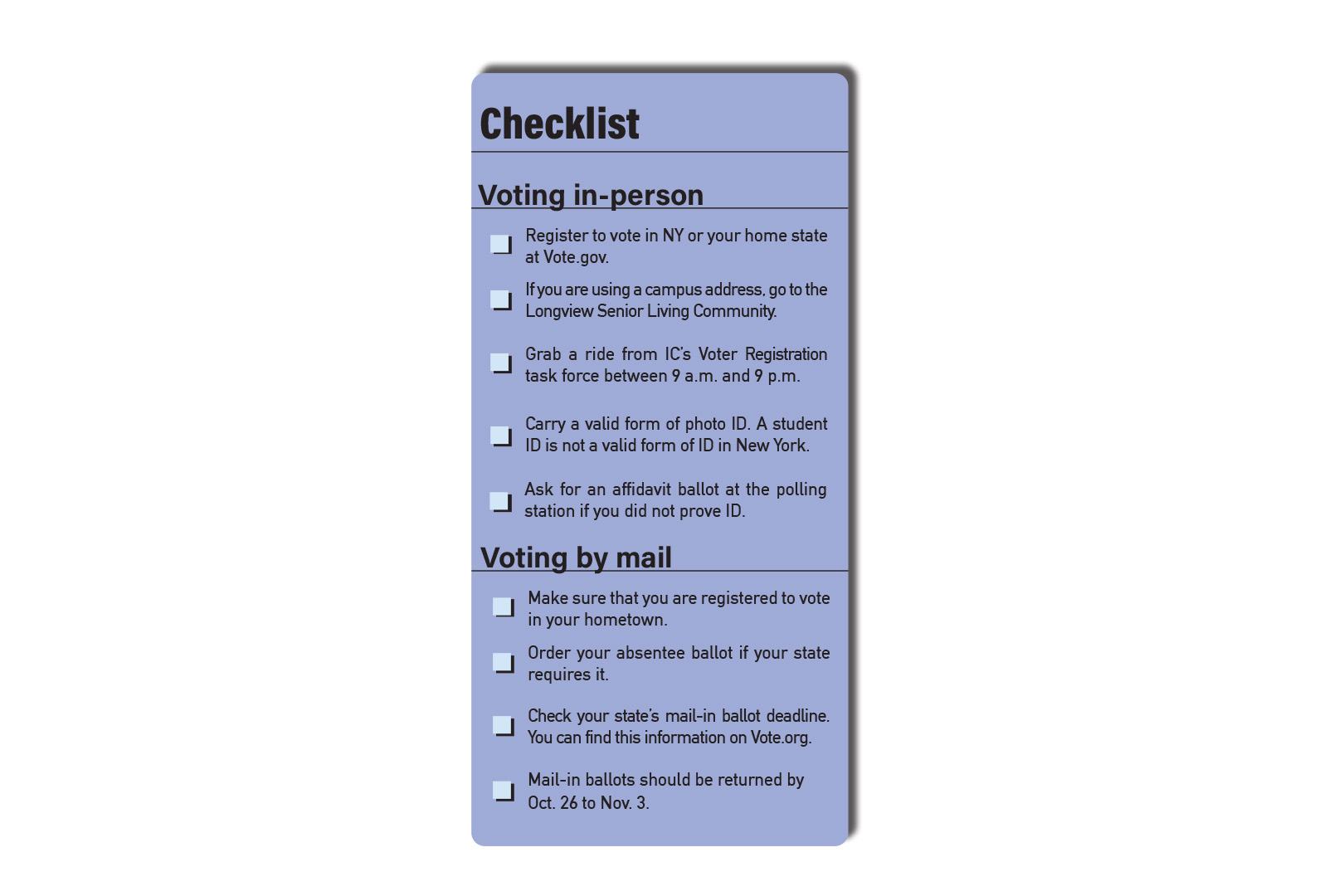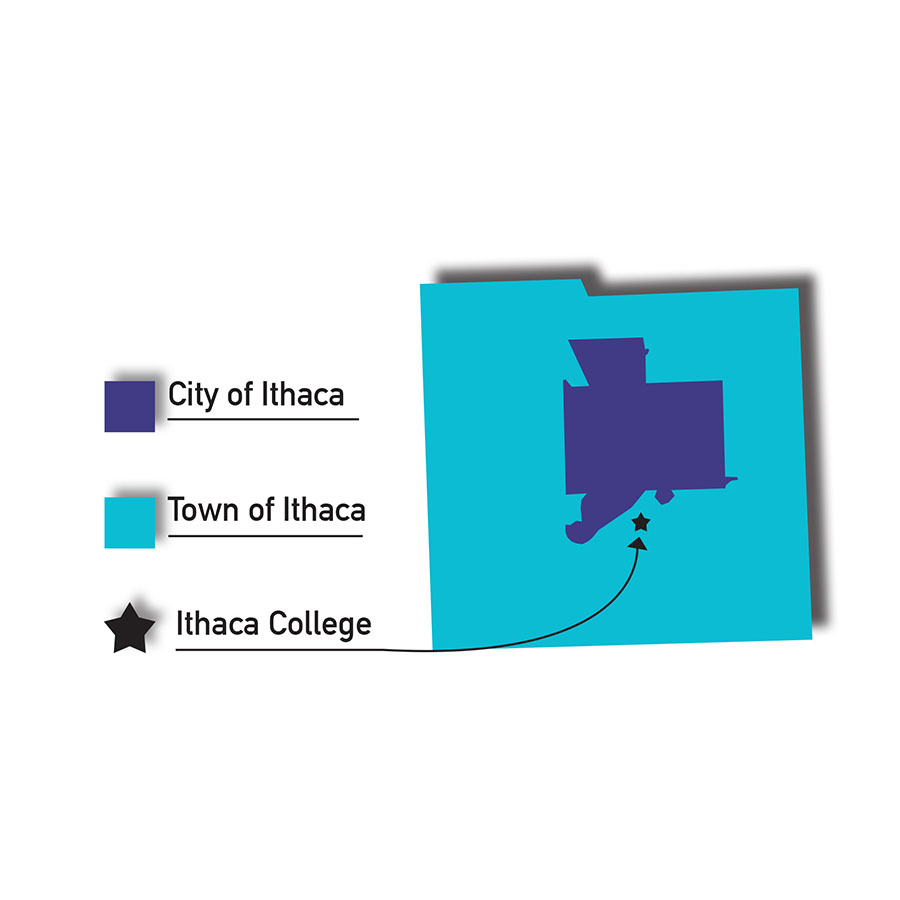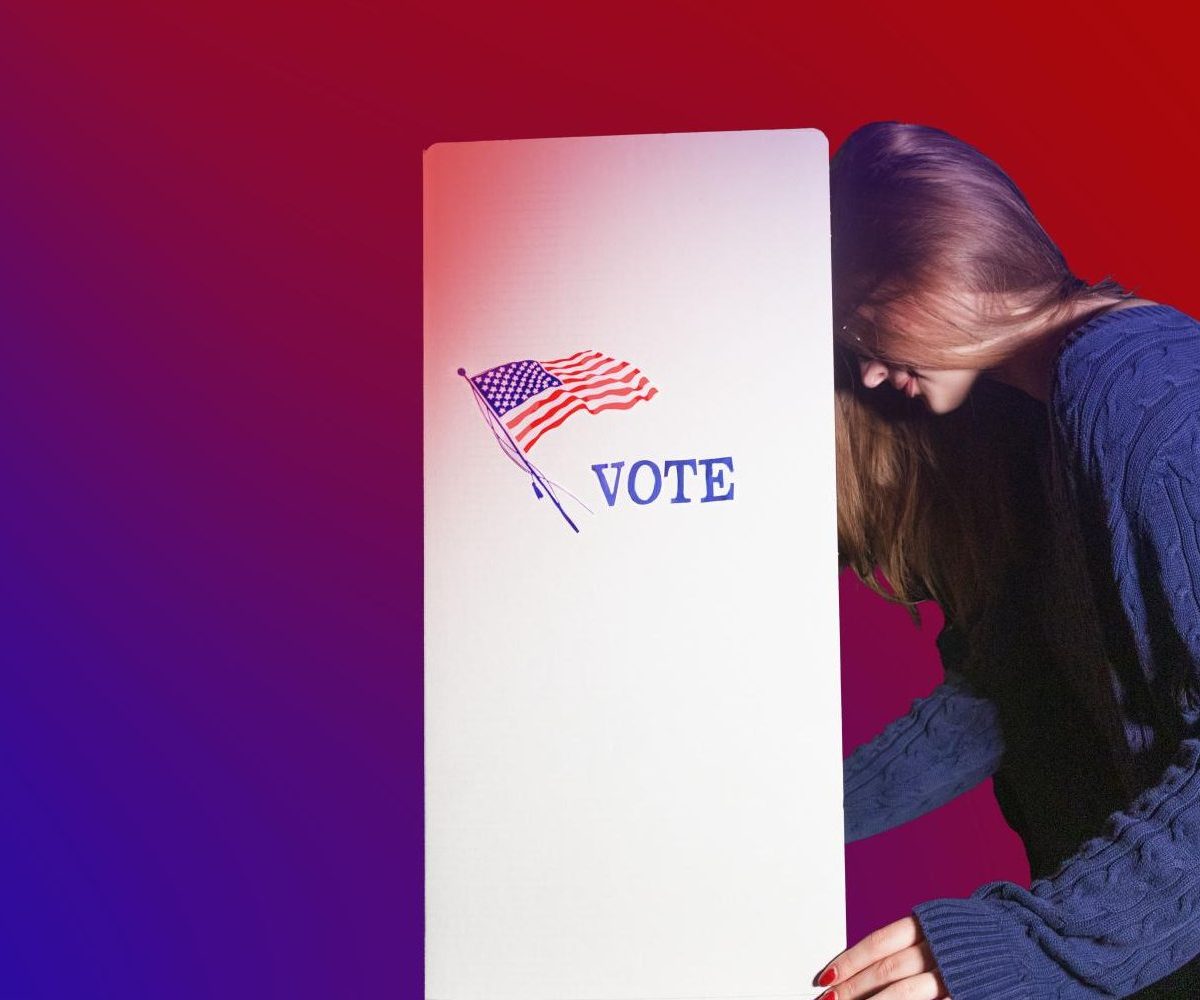2024 General Election Special Edition: ballot breakdown and voter guide
News
Community discusses proposal on the New York state ballot to protect against discrimination
Task force leads voting registration initiative at the college
Opinion
Commentary: Passing Prop 1 is needed for New Yorkers
Commentary: Campus community shares thoughts on 2024 elections
Editorial: Diversity of opinion on campus must be encouraged

Oct. 26 until Nov. 3
Early voting will take place at Tompkins County early polling sites between 9 a.m. and 5 p.m. from Oct. 26 until Nov. 3. Voting will be extended to 8 p.m. on Oct. 29 and Oct. 31.
Early mail-in voting will take place from Oct. 26 and Nov. 3.
Oct. 26.
Applications for mail-in ballots must be submitted to your home county’s Board of Elections.
Nov. 5
- Voting on Election Day will be open from 6 a.m. to 9 p.m.
- All mail-in ballots must be postmarked.
Nov. 12
Mail-in ballots must be received by New York state’s Board of Elections.
OR
Mail-in ballots must be handed to the NYSBOE.

City of Ithaca polling stations
- Lehman Alternative Community School
- Titus Towers
- Southside Community Center
- Greater Ithaca Activities Center
- Town of Ithaca Town Hall
- South Hill Elementary School
- Belle Sherman Annex
- Robert Purcell Community Center
Town of Ithaca polling stations
- Longview Senior Living
- Tompkins County Public Works Facility
- Linderman Creek Apartments Community Buildings
- Museum of the Earth
- Eliss Hollow Apartments – East Entrance
- BOCES
- First Congregational Church of Ithaca

Note: This information comes from an interview with Steve Dewitt, democratic commissioner for the Board of Elections from Tompkins County and information from the Board of Elections website.
Question: On the Tompkins County ballot, four people are running unopposed: Anna Kelles for the New York state assembly, Matthew Van Houten for Tompkins County district attorney, Maura Kennedy-Smith for Tompkins County court judge and Rick Wallace for Ithaca City court judge. Why is this?
Answer: Only one candidate for each of the roles filed a petition to run for office. In late February, there was a ballot access process where candidates who wished to run in their prospective political parties were required to get a certain amount of signatures to run in the primary. Across Tompkins County, a candidate needs 1,000 signatures to run in the Democratic Party, 506 signatures to run in the Republican Party, 17 signatures to run in the Working Families Party and 21 signatures to run in the Conservative Party. This means either candidates ran and did not get enough signatures or there was no competition for the incumbents
Question: Can one candidate on the ballot represent two parties? For example, why is Senator Lea Webb representing both the Democratic Party and the Working Families Party?
Answer: New York is one of five states in the U.S. that allows a form of fusion voting on the ballot. Fusion voting is a process in which more than one political party can nominate the same candidate. According to proponents of the concept, fusion voting allows minor parties to have greater influence and gives minor party candidates a chance to receive multiple endorsements.
Question: Why are there no local issues on the ballot for Ithaca voters?
Answer: To get a measure on the ballot, a citizen of Tompkins County needs to first bring the measure to their local municipality. In this election, three propositions were put on the ballot only in the Town of Enfield and none were brought up in any other municipality. The three propositions plan to increase the terms of town supervisor, town clerk and highway supervisor from two years to four years.
Question: Are college students able to vote in Ithaca?
Answer: As long as a student has lived in Tompkins County for 30 days, they can register to vote in Tompkins County. If a student does not have a New York State driver’s license, they will not be able to register to vote online. A student will have to print out a voter registration form and register with the last four digits of their social security number, then either bring the form to the Board of Elections office at 128 East Buffalo Street Ithaca, NY 14850 or mail it to the office. A student can also register in person at the Tompkins County Board of Elections office. To register to vote in New York or vote in their hometown you must be over 18 years of age, be a U.S. citizen, live at your present address for over 30 days, and not be in prison for a felony conviction.

Constituents of Tompkins County and the City of Ithaca will be voting on key positions in the judicial system Nov. 5. The Tompkins County court judge, the Ithaca City court judge and the Tompkins County district attorney are the judicial seats on the ballot for 2024.
Tompkins County Court judge
Maura Kennedy-Smith will be running unopposed within the Democratic and Working Families Party on the Tompkins County ballot. If elected, Kennedy-Smith will be the only female judge to serve the court in over 30 years and will serve a 10-year term. She would serve alongside two other judges, Joseph Cassidy and Scott A. Miller, and will be replacing Judge John Rowley, who retired in March after serving on the county bench since 2001.
Kennedy-Smith said she is committed to community welfare and social justice within the county court system. Kennedy-Smith said that when she began practicing law, she dealt with cases that involved people facing poverty, which she said has given her valuable insight.
“I think working with that population of clients really gave me an understanding of the struggles that a lot of the people we have in court face,” Kennedy-Smith said. “Transportation is not easy to come by [in rural areas] if you don’t have any money. So I try to bring that background to my decision-making on the bench.”
Kennedy-Smith has a background as a public interest lawyer and has served as the town justice for five years in the Town of Lansing and has 10 years of experience as principal court attorney in the Tompkins County Court.
Kennedy-Smith said she is focused on compassion toward the people whose cases she will be hearing. She said while looking at a case, she not only considers the legal implications, but the individual behind the case as well.
“You also have to consider the community, like, ‘Does that person have a family? Are they the only source of support for a family?’” Kennedy-Smith said. “Obviously, you have to weigh the consequences of whatever actions they took that led to a conviction. But you have to weigh those other things too.”
Ithaca City Court judge
Incumbent Rick Wallace is running unopposed as the Ithaca City Court judge and is running on both the Democratic ticket as well as the Working Families ticket. Wallace did not respond to a request for comment by the time of publication.
Wallace has been on the bench as the Ithaca City Court judge since 2015, which has a 10-year term limit. Prior to his election, he served as a partner at the Ithaca law firm Guttman and Wallace. He has also served as a volunteer board member of Tompkins County’s Offender Aid Restoration and was a former president of the Tompkins County Bar Association.
After graduating with a law degree from McGill Law School in Quebec, Wallace moved back to Ithaca where he was born and raised.
During his last campaign in 2014, Wallace ran on the premises of treatment court and developed a plan to reinvigorate the public service in the City of Ithaca. Treatment court allows citizens to seek treatment for substance abuse with court supervision rather than jail time.
“We emphasize addiction as a medical issue, not a moral shortcoming,” Wallace said in the article. “I constantly remind participants that they are not bad people trying to become good; they are unwell people trying to get better.”
Wallace said in a Tompkins Weekly opinion article that up until 2024, he exclusively presided over misdemeanor cases handled by the Ithaca Community Treatment Court. Starting this year he began to preside over a combined court that now includes ICTC and the county’s felony drug treatment court.
“I was a believer in treatment courts as a lawyer, when I saw them work wonders for my clients,” Wallace said in the article. “I never understood the nuances of how they worked until I had the privilege of presiding over one. The process is quite remarkable.”
Tompkins County district attorney
Incumbent Matthew Van Houten, Tompkins County district attorney, is running unopposed for another four–year term on the premises of restorative justice. Van Houten has been the county DA since 2016 and if reelected, this will be his third term.
The responsibilities of a DA include prosecuting all violations of New York state law within the county. There is a wide range of violations a DA handles like felonies, misdemeanors and traffic violations.
The DA Office’s mission statement is to uphold inclusivity in the courtroom and maintain the county’s values of integrity, accountability, community and respect.
Van Houten said he believes the county’s justice system is a model for the country because of its holistic approach toward prosecuting and the county’s low jail population.
“Our jail population is one of the lowest in the country per capita because we take it very seriously when we are advocating for someone to go to jail,” Van Houten said. “We do that as a very last resort, because it’s never a solution. It doesn’t help anyone. It doesn’t heal anyone. It’s just a last resort that sometimes is necessary but should not be used lightly.”
Van Houten said one of the ways he plans to achieve his goal of progressive and holistic prosecuting is by looking at the bigger picture.
“[My office is] thinking of new ways [to prosecute], not just accepting the system and the status quo as the right way to do things, trying to think outside the box of how to resolve a case with accountability and closure,” Van Houten said. “But also not imposing arbitrary standards on someone, giving people a chance to learn from their mistakes and to not be stigmatized for the rest of their lives by a criminal conviction.”

Updated as of Nov. 5: Lindsay Lustick Garner, a real estate broker in Ithaca, announced a write-in campaign challenging Assemblymember Anna Kelles on Oct. 24. Garner is a registered Democrat and her priorities include affordable housing, better payment for teachers and lowering crime rates.
Assemblymember Anna Kelles is running for re–election in New York State’s District 125. Kelles’ district includes Tompkins County and the southwest part of Cortland County. She was first elected in 2020 and then again in 2022. Assemblymembers are elected every two years and because they have no term limits, Kelles is able to run for the position a third time.
Kelles is a Democratic candidate and has advocated for environmental protection, women’s rights, accessible health care and criminal justice reform. Before becoming an assemblymember, Kelles attended Binghamton University where she graduated in 1997 with bachelor’s degrees in biology and environmental studies. She then went on to earn her doctorate in nutritional epidemiology from the University of North Carolina at Chapel Hill in 2008. After getting her Ph.D. she taught sports nutrition at Ithaca College from 2008–09.
Kelles has a background in environmental studies and public health, and she advocates for protecting the health of the people and nature in her district. Kelles said she supports the New York Health Act and aims to speed up the progress on the Climate Leadership and Community Protection Act.
Economy
During her time as an assemblymember, Kelles has worked to provide small business owners with extra aid. According to Kelles’ campaign website, she has sponsored legislation that provides matching grants to small businesses under the small business innovation research program or the small business technology transfer program. She has also sponsored legislation that provides tax credit for small businesses employing a person who has previously been convicted of a crime.
Health care
Kelles’ primary focus when it comes to health care is on mental health and the health of incarcerated individuals. During her time as an assemblymember, Kelles has sponsored legislation that requires training for teachers, administrators and instructors in the area of mental health response. She has also sponsored legislation that prohibits improper treatments of incarcerated individuals from health care professionals.
Environment
In regard to the environment, Kelles supports preservation and restoration. According to her website, Kelles has sponsored legislation that allows the Department of Environmental Conservation to add to lists of prohibited and regulated invasive species on an emergency basis and requires fashion sellers to be accountable to standardized environmental and social due diligence policies.

Republican Marc Molinaro, incumbent representative of New York’s 19th district, is expected to face a close race Nov. 5 from challenger Josh Riley, a Democrat and a member of the Working Families Party, a minor progressive political party that focuses on advancing economic, climate and social justice. The congressional race is listed as a toss-up by Cook Political Report, meaning either candidate has a good chance of winning. In 2022, the two candidates faced off and Molinaro won by 4,495 votes, receiving 146,004 votes to Riley’s 141,509.
Jan. 3, 2023, Tompkins County moved from the 23rd congressional district of New York to the 19th. There are 31,040 people in Tompkins County registered as Democrats and 10,136 who are registered as Republicans. With most Tompkins County members being Democrats, the county could sway the election.
Riley is running on a platform that focuses on defending abortion rights, lowering taxes for the middle class and enhancing public education.
In an interview with The Ithacan, Riley said that when he visits campuses the issue he hears about the most is reproductive freedom, which he wants to prioritize. He said that when he gets to Congress, he will sponsor the Women’s Health Protection Act, an act that creates federal protections for abortion.
“I hear a lot from college students about the affordability crisis,” Riley said. “It’s really hard to get out of college, carry that student debt and try to start a life. … The affordability crisis in a lot of ways can be traced back to the corruption in our politics. So I don’t take any corporate [Political Action Committee] money.”
PACs are committees that raise and spend money to support political candidates that represent their business, ideological or labor interests. PACs can legally donate $5,000 to a single political candidate annually. Super PACs make no direct donations to political opponents but can spend unlimited money supporting candidates through advertisements or sending messages that directly support a candidate. Molinaro is backed by Elon Musk’s super PAC America PAC, which has just spent $300,000 to support Molinaro’s campaign. As of Sept. 30, Musk is the richest person in the world.
Riley’s campaign website said that if he is elected to Congress, he will work to lower costs by supporting policies that crack down on price gouging to prevent corporations from profiting from artificially-increased prices, cap the cost of critical drugs and break up big monopolies.
Another big issue for Riley is climate change. Riley’s campaign website said he believes existential threats to the environment need bold reactions. If elected, he will support policies that ensure clean drinking water for everyone through updates to the Safe Drinking Water Act, establish energy dependence by ending reliance on fossil fuels and create jobs for building American-made products needed to fight climate change.
Riley’s campaign website also said he believes health care should be a civil right in the U.S. and he supports policies that lower the cost of prescription drugs, improve health care access in rural communities and strengthen Medicare to cover hearing, dental and vision services. Riley is also in favor of policies that “prohibit corporate PACs that are controlled by insurance and drug companies from buying influence with politicians.”
Molinaro’s policy platform includes reducing inflation and the cost of living, encouraging cryptocurrency and solving the United State’s energy crisis. Molinaro has said he does not support a federal abortion ban and he will uphold the right to abortions in New York. Molinaro did not respond to an interview request with The Ithacan.
Molinaro’s campaign website said his main focuses when it comes to health care are addressing the nation’s mental health crisis and ending the opioid epidemic. During his time as county executive for Dutchess County, Molinaro helped open a 24/7 crisis stabilization center that offers a single point of service for walk-in patients to access medical care like mental health assessments and supervised outpatient withdrawal services.
Molinaro’s plan for the future includes creating an opioid response program that will allocate funds to local governments responsible for offering medical services and supporting the bipartisan Mental Health Professionals Workforce Shortage Loan Repayment Act. The act works to address the mental health care provider shortage by expanding roles for other types of providers like nurses, nurse practitioners and physicians assistants.
According to Molinaro’s campaign website, his efforts to help the environment focus on a reliable and independent energy future. If re–elected, he will commit to this belief by supporting innovation in the country’s energy sector through grants from the Department of Energy’s National Labs and supporting a wide variety of energy sources like wind, solar, nuclear, hydro and geothermal energy.
Molinaro’s campaign website also said his main focus for the economy is to reduce inflation and the cost of living. His plan for the future includes lowering inflation by adjusting parts of the federal individual tax code and reducing the tax burden by limiting discretionary spending, which is money that is approved by congress during the appropriations process.
Over 80% of Riley’s campaign contributions come from individual contributions, with only 5.73% of his donations coming from non-corporate PACs. Riley has raised $5,230,941 from his campaign. 36% of Marc Molinaro’s campaign donations come from PACs while 41.95% comes from individual donations.
Riley said it is important for college students to vote because the 19th congressional district is one of the most competitive districts in the country and college students in Tompkins County have a special opportunity to shape the direction of the nation.
“New York state might not be the swing state in the presidential race, it won’t decide the control of the Senate, but what we do here in this district, in this election, very well could determine who controls the House of Representatives and the agenda that follows from that,” Riley said. “Especially for students who are at Ithaca College or Cornell [University], this is a very special opportunity to engage in politics in a battleground.”

Democrat Lea Webb is running for reelection for her seat as the senator for New York State Senate District 52. She is being challenged by Republican Mike Sigler, Tompkins County Legislator. New York state will have its Senate elections Nov. 5.
Webb’s key issues are reproductive justice, housing, the environment, education and support for working families. Sigler is running on crime and policing, inflation, job creation, energy and climate and fighting the drug epidemic.
The Equal Rights Amendment, also called Prop 1, will be the only New York state proposal on the ballot, and would amend article I section 11 of the New York state Constitution.
Webb voted in favor of the ERA in the New York Senate.
“When New Yorkers go to the polls to vote this coming November, they will have the opportunity to protect the right to abortion in our state constitution,” Webb said via email. “In addition to codifying the right to abortion in our state constitution, passing the ERA will ensure equal protection from discrimination to women, LGBTQI+ individuals and many more New Yorkers.”
Sigler said he sees the proposal as a “Trojan horse” that masks what the bill actually does with abortion protections.
“Abortion has been legal in New York state for half a century,” Sigler said. “No Republican in the state legislature is suggesting a change to what the law is right now, and yet, what they’ve done is they put that forward, and they’ve attached a bunch of other things to it, like allowing boys into girls sports that a lot of people don’t support. … So they’re kind of masking what the bill actually does with something that most people agree with.”
Sigler is referring to the part of the ERA that prevents discrimination based on gender identity and gender expression. Critics of the ERA see the vague language it uses as leaving room for interpretation. The protections on gender identity and gender expression can be interpreted as protecting transgender athletes’ right to participate in school sports with cisgender athletes.
Health care
Webb helped eliminate copays for insulin in New York and her campaign site said she passed medical debt reforms that protect people from being denied care. She said she is committed to protecting and increasing access to reproductive and maternal health care.
“As chair of the NYS Senate Committee on Women’s Issues, I have been able to pass legislation addressing a wide range of issues impacting women, including menstrual product accessibility, improved maternity health services, reinforced reproductive rights, enhanced protection against fibroids and ovarian cancer, and stringent measures to prevent human trafficking,” Webb said via email.
Sigler said he wants to provide resources to fight opioid addiction, suggesting putting a detox center in every county. His campaign site said he would like to see the state put forward bills that would fully cover cancer treatment in the New York state budget. He said he wants to address mental health, mentioning how New York has lost 990 beds at inpatient psychiatric facilities and that only 222 have been recovered.
“We talk about mental health locally,” Sigler said. “We’re trying to build a mental health stabilization unit in partnership with a hospital. … [The state is] not addressing mental health, I think, to the extent that we need to.”
Economy
Webb’s campaign site states that she helped pass $350 million for the Refundable Child Tax Credit in the 2024–25 New York State budget. Her campaign site said she delivered $150,000 for workforce development initiatives with the Broome, Cortland and Tompkins County Chambers of Commerce as part of that budget. She said she prioritizes the needs of working families and wants to make New York more affordable.
“Our region has been reeling from years of significant underinvestment, and un-doing that underinvestment takes time,” Webb said. “I am committed to making our region and state more affordable by expanding housing for low and middle-income families, lifting up wages, continuing to invest in our public schools, and supporting our small businesses.”
Sigler’s campaign site says he has experience making job creation easier through his role on the Industrial Development Agency in Tompkins County. He said he prioritizes giving funding to local governments over the state, citing the state withholding federal aid for Medicaid from counties.
“We used to get federal Medicaid Assistance Program money,” Sigler said. “The state came along and decided to pocket that money instead of sending it down to the counties. … What I wanted to do was go into Albany and get that money back.”
Incumbent Sen. Kirsten Gillibrand, Michael Sapraicone and Diane Sare are on the ballot for the U.S. Senate election in New York state. This is the only seat on the ballot that has three candidates contesting.
Gillibrand is a Democratic candidate who ran for president in 2020 and is being challenged by Sapraicone, a retired New York City Police Department detective and founder of Squad Security, a private security company. Sare is a LaRouche Party candidate who has run for the U.S. House of Representatives in New Jersey’s 5th Congressional District in 2012 and 2014, and is also seeking the senate position.
Economy
Gillibrand’s campaign focuses on job growth and the establishment of small businesses through the Main Street Employee Ownership Act and increasing the minimum wage. In Nov 2021, when the Bipartisan Infrastructure Law was passed, — which implemented more equitable public transport — she prioritized hiring people from local communities.
Sapraicone’s economic policy includes the restoration of a state and local tax deduction, the reversal of a $1 billion cut from the NYPD and reducing inflation. Sapraicone also supports blocking the MTA’s congestion pricing program that was implemented in June.
Sare’s plan states that commercials and investment banking should be separate from each other and that the National Bank should replace the Federal Reserves. Sare has proposed projects the U.S. could take part in that help develop the nation’s infrastructure.
Healthcare
Gillibrand opposes the privatization of Social Security and prioritizes healthcare for all New Yorkers. In June 2023, Gillibrand passed the 9/11 health bill, which helps to ensure that first responders and 9/11 survivors can get access to healthcare.
Sapraicone supports Social Security and Medicare benefits for seniors. In 2021, he was appointed to the board of directors of Mount Sinai South Nassau. While in this role, he has helped finance and develop projects at the hospital, as well as oversee hospital functions.
On August 13, Sare protested the closure of the Mount Sinai Beth Israel Hospital in the Lower East side of Manhattan and spoke to the press about the closure being an example of big corporations looting vulnerable populations, like the sick and the elderly.
Abortion
In 2021, Gillibrand established efforts to fight for reproductive rights. This included a statewide public information campaign and the development of a patient bill of rights to inform women of their rights and legal protections.
Sapraicone is in favor of a seven-week abortion ban, according to an interview on 710 WOR. He believes New York’s laws are too liberal, but does not support a national abortion ban. Sapraicone thinks that restrictions on abortions should be made by individual states.
Sare does not have a clear stance on reproductive rights. Instead, the LaRouche party favors focusing on other issues, like implementing nuclear fusion energy as well as building electric rails that can connect the entire U.S.

As the general election on Nov. 5 approaches, Vice President Kamala Harris and former President Donald Trump will be vying for the majority of the 270 electoral college votes to win the presidential election.
Harris will be running alongside Minnesota Gov. Tim Walz. Walz became governor in 2019 and represents farmers and rural Americans. Before that, he served in the Army National Guard for 24 years and retired as a high-ranked National Guard soldier.
Junior Ohio Senator J.D. Vance will be running alongside Trump in the 2024 presidential election. Vance became a senator in 2023 and was enlisted in the Marines for four years before serving in Iraq in 2005.
Economy
Harris’ campaign site outlines her economic plan, which includes expanding the child tax to $3,600 to 100 million Americans and a $6,000 tax cut to help families pay for a child’s first year of life.
Trump’s economic plan outlines policies like cutting spending and making tax cuts permanent through the Tax Cuts and Jobs Act. The Act plans to eliminate taxes on tips for restaurant and hospitality workers. The agenda also promises that “Republicans will pave the way for future Economic Greatness by leading the World in Emerging Industries,” like cryptocurrency, artificial intelligence and innovations in space.
Healthcare
According to Harris’ campaign, cutting the costs of expensive drugs will help Americans to take prescription drugs by making them more affordable by increasing competition and transparency among healthcare companies. Harris also plans to strengthen Social Security and Medicare, and is expected to follow President Joe Biden’s plan to raise taxes for people who have higher incomes to reinforce Social Security.
Trump’s campaign outlines that he plans to “make the ‘American Dream’ affordable again,” and plans to protect Medicare and promote competition between drug companies to decrease costs for citizens.
Environment
The Harris-Walz campaign will also advocate to protect Americans from the climate crisis by maintaining the values of the IRA, which includes reducing national emissions by 40% by 2030. However, Harris is not opposed to fracking and natural gas production.
Trump also plans to lower energy prices like natural gas, coal and oil beyond record levels if he is elected. The plan also outlines that Trump wants to do away with mandating electric vehicles — which most states are trying to implement — and cut environmental regulations.
Your donation will support The Ithacan's student journalists in their effort to keep the Ithaca College and wider Ithaca community informed. Your contribution will allow us to purchase equipment and cover our annual website hosting costs.












